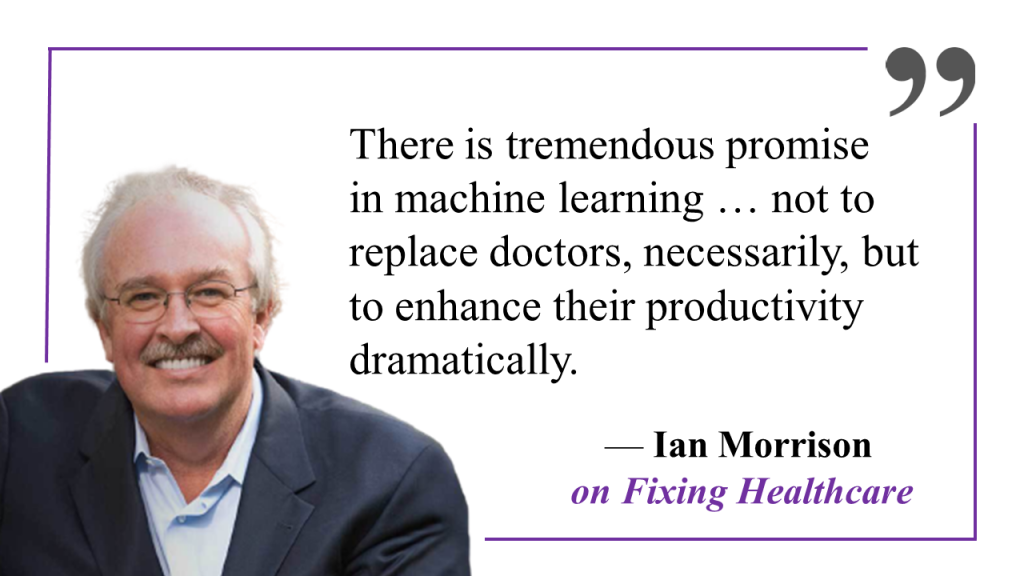Podcast: Play in new window | Download
Subscribe: Spotify | Email | RSS | More
The Fixing Healthcare podcast welcomes back Ian Morrison, a globalist, futurist and popular returning guest who, in Season 1, taught us that “every healthcare system sucks in its own unique way.”
Now in Season 7, podcast cohosts Jeremy Corr and Dr. Robert Pearl are focused on breaking the unwritten rules that hold doctors (and the entire U.S. healthcare system) back.
They asked Ian for practical tips on breaking the rules that currently govern: healthcare technology, the revenue obsession in hospitals, the incumbency of industry leaders and asymmetry of information between doctors and patients.
Ian Morrison Interview Highlights
On the challenge of breaking the rules
“I think the resistance of an industry [must be overcome], because I think the unwritten rule of medicine … is that this is not a profit maximizing industry. It’s a revenue maximizing industry. It seems to me all these board retreats in hospitals, every single one of them has in their top five imperatives ‘growth’ and guess what? We grow. The revenue keeps going up … And I think the U.S. is sort of addicted to growth. And the other one I would point to is addicted to self-insured employers, writing a very big check, massively larger than the actual cost of delivering care. I think those are the two sort of fundamental issues that we need to reevaluate.”
On the biggest threat to changing healthcare
“I think incumbency … I always say, if you’re going to disrupt American healthcare, the American healthcare system is larger than the entire Italian economy and about as well organized, right? So if you’re going to disrupt healthcare, it’s a bit like disrupting Italy, good luck with that … The thing that prevents us from doing it is incumbency, quite frankly. And we have a lot of institutions who are on this revenue-maintenance track. And it’s very hard to disrupt that at the scale that we currently have invested in the American healthcare system. Not that it’s all wasteful, but that there is considerable power to that incumbency.”
On the problem with consumerism in healthcare
“It’s a tough industry because of the asymmetry of information. You’re a doctor, you know stuff I don’t know as a patient. And therefore, as a transaction, when I’m purchasing health services or I’m seeking health advice, I really have to rely on your agency to help me get through the difficult times. And that tends to be the experience patients have, having been a patient not that long ago, you cease to be sort of a rational consumer and become a kind of frightened human where you defer to expertise. And I think that is a fundamental barrier that exists to actually having a more market-like or consumer-responsive health system. But that shouldn’t excuse us in healthcare.”
On the drop off in telemedicine usage
“If all we do is pave the cow path, in other words, substitute an e-visit or telehealth visit for an in-person visit, all we’ve done is really save travel time and parking, right? What we really want [are] productivity enhancers. And I think that requires … rethinking end-to-end clinical processes to be more digital in their mix. And that’s easy to say as a futurist, it’s hard to do because it really requires rethinking the way in which clinical services are organized and delivered … It takes clinicians with the right technological support to really redesign those delivery models for the future.”
On the unaffordability of healthcare today
“In 1970, if you provided health benefits to a family, it cost about 10% of the minimum wage. Today, it’s 150% of the minimum wage. And … what that leads to in terms of behavior, particularly with the rise of high deductible health plans, has been people foregoing care and about a third of Americans claim they do that. And it was exacerbated through the pandemic … I think the long-term answer of affordability is change the way we do what we do, which is what you and Robbie, I think are trying to do with this series is to draw attention that to fix healthcare, you’ve got to actually fix the care-delivery process going forward.
READ: Full transcript with Ian Morrison
* * *
Dr. Robert Pearl is the author of a book about medicine’s invisible yet highly influential physician culture. Check out “Uncaring: How Physician Culture Is Killing Doctors & Patients.” All profits from the book go to Doctors Without Borders.
Fixing Healthcare is a co-production of Dr. Robert Pearl and Jeremy Corr. Subscribe to the show via Apple, Spotify, Stitcher or wherever you find podcasts. Join the conversation or suggest a guest by following the show on Twitter and LinkedIn.

